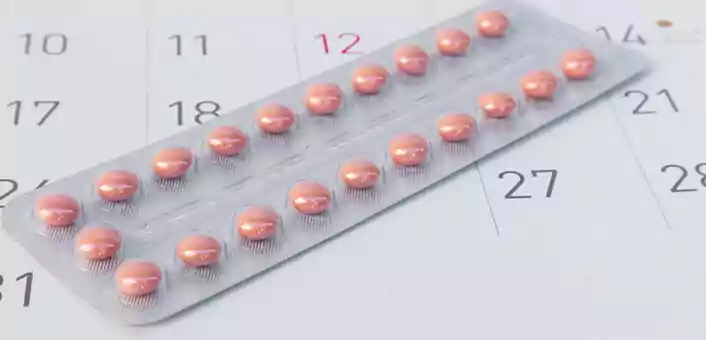
Awareness
How Useful Are Birth Control Pills For PCOD?
Sep 4, 2017Birth control pills or oral contraceptive pills are given to women with Polycystic Ovarian Syndrome (PCOS) or Polycystic Ovarian Diseases (PCOD.) These pills are given to regulate their menstrual cycles. These drugs are also used to treat acne and facial hair in such women, since they often have high levels of male hormones. Hormone pills, with the hormones estrogen and progestin are what doctor’s reach for when women come in with symptoms of PCOD. These can be in the form of the well-known “pill,” (oral contraceptive), or vaginal rings or skin patches.
Important Note: This article is about how birth control pills work when conventional doctors give them to women with PCOS. We DON’T believe this is a cure for PCOS. We believe the root cause of PCOD is something else. Fixing that is what fixes PCOD.
Possible Medical Benefits of Birth Control Pills in PCOS
Young women with PCOD who take oral contraceptive pills could benefit from:
- Regular but lighter periods
- Less facial and body hair
- Clearer skin (acne reduces)
- Lesser or no menstrual cramping and pain
How Do Birth Control Pills Help Women with PCOS
A 1965 study found that if women took medicines called “ovulation inhibitors”, they reduced the activity of male hormones in their body. These medicines reduce the number of follicles produced in a woman’s body, something that happens between Day 1-15 from the start of the period.
All women have a delicate balance of two hormones – progesterone and estrogen. Progesterone reduces ovulation. It also reduces male hormones. So, when women complained of facial hair, acne and other things caused by excess male hormones, they were given progestin (progesterone-like compounds). This helped. With time, a more sophisticated pill was developed, that combined progesterone and estrogen both, to treat women with irregular periods.
These drugs reduce the number of follicles by 1) interfering with signals sent by the brain to the ovaries or 2) interfering with the ovaries themselves.
This therapy has one more additional benefit for PCOD sufferers. It can protect her from uterine cancer. When a woman isn’t ovulating (releasing an egg from a follicle) regularly, she does not have normal periods. This leads to abnormal thickening of the uterine lining. This is called “endometrial hyperplasia.” This increases the risks of uterine cancer. The progestin/progesterone in birth control pills helps prevent this.
Popular Types of Hormonal Birth Control
There are different options to choose from. You can discuss the best option with your doctor.
Oral contraceptive pills (“the pill”)
- Apri
- Azurette
- Yasmin
- Zarah
- Beyaz
- Zovia
- Levora
- Portia
- Trivora
- Ogestrel
Skin Patch
- Ortho Evra
- Xulane
Vaginal Ring
- NuvaRing
Injection
- Depo-Provera
How To Use Birth Control Pills
Oral contraceptive pills come in different forms. They can be either combination pills (having two hormones, progesterone/progestin and estrogen) or they can be progestin-only. Combination pills usually come as 21-day or 28-day packs. You can take these pills once a day at any time that suits you. You can start taking the pills from the first day of your period or within 5 days from the day your period starts.
Progestin-only pills, also called “mini pills,” have to be taken within the same three hours every day. These come in 28-day packs. You can start taking these pills at any time but remember that pregnancy protection with these pills begins after 48 hours.
A birth control patch is used by sticking it to clean, dry skin on your belly, upper outer arm, buttocks or back. (Caution – NEVER stick a birth control patch on your breasts!) Wear the patch for 7 days, remove it on the eighth day and apply a new one in its place. Do this for three weeks straight. In the fourth week, you’ll get your period. You aren’t supposed to wear a patch in the fourth week. Apply a new patch immediately after your patch-free week.
A vaginal ring is a small flexible rubber ring that releases a constant amount of hormones that the blood vessels in your vagina absorb. Gently insert it into the vagina and let it remain there for 21 days (3 weeks). You have to remove the ring after three weeks on the same day you had inserted it (If you had inserted the ring on a Monday, you have to remove it on the fourth Monday).
Stop using the ring for one week (the fourth week). You won’t get your regular periods when you are using the ring. You will, however, bleed lightly. This is called “withdrawal bleed.” It happens because you aren’t taking the hormones during the ring-free week. In some women, it might not happen at all. After the ring-free week, insert a new ring (on the eighth day) and continue the cycle. Remember to insert a new ring starting the new week even if you are still bleeding.
Safety and Precautions for Using Oral Contraceptive Pills
Your doctor will need to regularly check you for any unwanted side effects while you are on this treatment. Tell your doctor if you are allergic to any of the compounds in the pill or have any other kind of allergies. You need to tell the attending doctor that you are taking oral contraceptive pills before any kind of emergency treatment or surgery.
You need inform your doctor about any health condition you might have or had in the past before starting with oral contraceptives. These include:
- History of cardiovascular disease
- Chest pain
- High blood pressure
- Gallbladder disease
- Liver disease
- Depression
- Unexplained vaginal bleeding
- History of cancer
You should stop smoking before starting oral contraceptives. Consult with your doctor about the safety of this treatment while you are breastfeeding.
Do Oral Contraceptives Interact With Other Drugs
The following drugs may reduce the efficacy of oral contraceptives:
- Rifampin (an antibiotic used to treat tuberculosis)
- Anti-HIV drugs
- Griseofulvin and ketoconazole (antifungal drugs)
- Anti-seizure drugs like carbamazepine, felbamate, phenobarbital, etc.
- Modafinil (used to treat sleep disorders)
- Herbal remedies (saw palmetto, flaxseed, alfalfa, garlic pills, St. John’s wort)
Oral Contraceptives for PCOD: The Final Verdict
There a hundred different types of oral contraceptive pills available in the market today. There has been no study that compares them with each other for safety or efficacy for PCOS. If you decide to go with birth control pills for your PCOS, your doctor will help you choose. Again, please note: we don’t think birth control pills solve the root cause of PCOD. That involves diet and lifestyle changes. Even if you choose to use tablets, dietary supplements and herbals may have fewer side effects than birth control pills.
Managing PCOD can be tricky, especially if you just try to treat individual symptoms with medicines. Oral contraceptives are effective to an extent in helping a woman with some of her symptoms. Unfortunately, there are long-term complications that can do more harm than PCOS itself.
While doctors will prescribe drugs to treat symptoms, you will be pleasantly surprised to know that lifestyle changes can have a huge impact on many aspects of your PCOD. For example, if you are overweight or obese, losing weight can help regulate your menstrual cycles as well as help reduce your insulin resistance. So, if you look at PCOD from a holistic perspective, you’ll realize that diet, lifestyle changes and managing everyday stress will go a long way in helping you reverse this condition.




